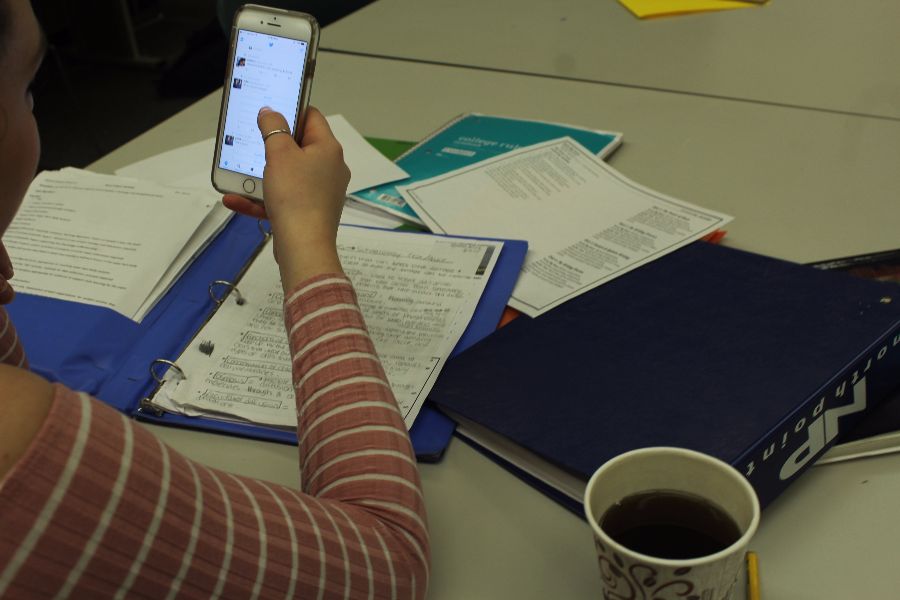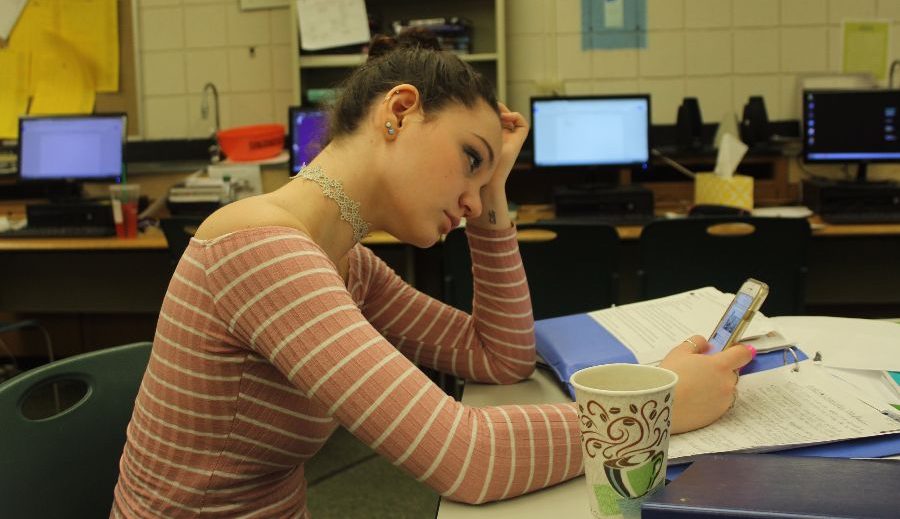Live-tweeting through life
Students, others grapple with the effects of social media on youth
February 3, 2017
When watching one of those critically acclaimed teen-angst movies from the 80s, one may come to a very important realization: being a teenager was somewhat simpler back then.
In “The Breakfast Club,” a group of unlikely friends were forced to spend hours together in detention, with nothing but their own awkward conversation to amuse themselves. No texting. No Snapchat. No thoughtless scrolling through endless timelines.
Today, it would be a much different movie. Claire (Molly Ringwald) would likely keep to herself on her rose-gold iPhone. Bender (Judd Hearst), would no doubt be tweeting obscenities and listening to a (probably illegally downloaded) death metal album instead of trying to plunge through the prickly social divide that separates most teens.
Senior Danielle Bennett is familiar with this phenomenon of technology seeping into her social interactions firsthand.
“When I hang out with friends now, all of us are on our phones and it’s kind of the main focus,” Bennett said. “Like ‘oh, take this Snapchat,’ or we’ll be sitting around together texting and not really talking to each other, like even at a restaurant.”
I see teens and adults alike missing out on great moments because they are too busy documenting or posting about the experience and not living it.
— Psychology teacher Jennifer Weisbrodt
It is apparent that the use of social media has drastically increased in the last 15 years. According to a study from Pew Research Center, 92 percent of teenagers report they go online daily. To add to that, only a measly 2 percent reported going online less than weekly.
These statistics show that while many teens can be found hiding out in their bedrooms, the one place they are definitely guaranteed to be is online.
Without a doubt, the internet is expanding and bringing more information with it than one could imagine. Now, teenagers are exposed to anything they can Google, and the growing realm of social media adds an emotional aspect to the mix.
So, is this really an improvement for teenagers’ wellbeing?
Psychologists, social workers and weary parents have debated the cons of the overly connected teen culture for years. Aside from the very real problems of cyber bullying, which no one with a heart could dispute, the ramifications of electronic or technological dependency can have far-reaching harmful effects on teenagers.
Tweets and snaps are just more ammunition capable of blowing holes in teenagers’ reputations and permanent records.
“I know people get themselves in trouble all the time, whether if it’s with their parents or at school because of things they say online,” Bennett said. “I know personally I’ve gotten myself in trouble just because I’ve gotten in an argument over text and my parents found out, and I’ve said some things that I wouldn’t have said in person.”
Bennett notes that Twitter is one of the biggest hunting grounds for issues to occur. Whether people use the platform to expose their friends or even tweet vague things that make people feel accused, it is apparent that more often than not, Tweets are brought into the world out of spite. Also, keeping tabs on friends and followers by electronic means lessens the need for actual face-to-face interaction.

According to a 2015 Pew Research center study, 92 percent of teenagers said they are online daily
If someone live tweets their way through their school day, soccer practice, dinner and even homework, there’s really no desire for anyone to want to know more.
Nothing is left to the imagination. Nothing to be curious about. No need to ask questions because their followers already know everything.
This makes that tweeter both a crushing bore and a small scale local celebrity, depending on the point of view. It’s risky behavior, because that person can be equally shunned and/or celebrated for their over-sharing on any given day.
This neverending contact can leave some teens feeling drained. Psychology teacher Jennifer Weisbrodt notes that constantly being socially “on” isn’t always a good feeling.
“I see teens and adults alike missing out on great moments because they are too busy documenting or posting about the experience and not living it,” Weisbrodt said via email.
Millennials view their cell phones as extensions of themselves—as if they are another critical appendage. Cautious parents risk cutting that important lifeline and severing an intense relationship between a world of infinite information and a nosy, or at least curious, teen. In that conflict lies the problem. It’s a catch-22 that parents hate and teens dread. And so far, it looks like teens are getting their way.
Just be aware of what you’re posting and who’s gonna see it.
— Junior Blerina Berisha
Social hierarchies are created and built in very nuanced ways on social media, and the intricacies of it will never be fully understood by adults. That’s why teens will always seem one step ahead of their parents.
Junior Blerina Berisha has felt the effects of being online since she has increased her social media use. From knowing exactly how many followers she has to being up-to-date with everything on her timeline, Berisha notes a definite difference in her day-to-day life and actions.
“Just be aware of what you’re posting and who’s gonna see it and who you’re following,” Berisha said. “I just find that people are always influenced by what is going on outside and if they see that someone is doing something then they see that it is OK to do it.”
